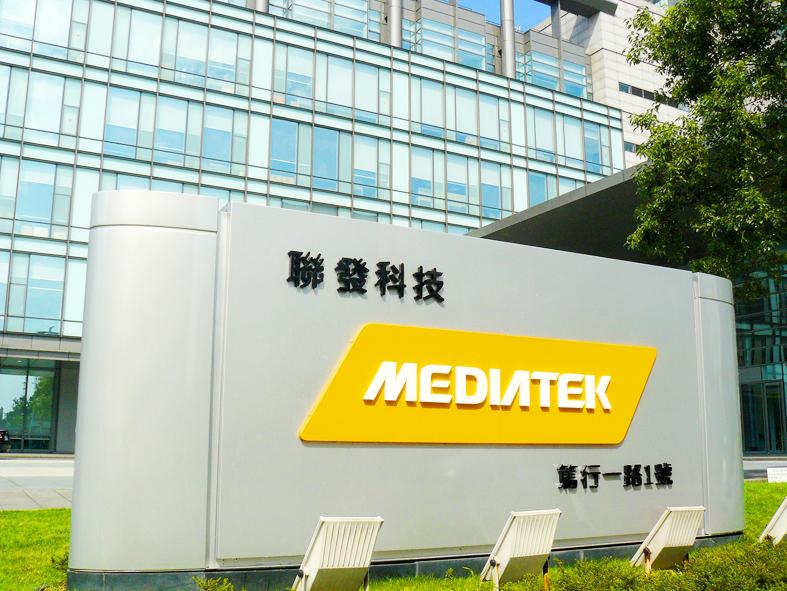MediaTek Inc (聯發科), the world’s biggest supplier of 5G smartphone chips, yesterday posted record net profit for last quarter and forecast 40 percent annual revenue growth this year, benefiting from robust demand for its flagship 5G smartphones chips and other chips.
The Hsinchu-based firm said that growth momentum would this year accelerate, thanks to healthy end-market demand and an increase in new IC design projects.
Last year, revenue grew 30.8 percent to NT$322.15 billion (US$11.53 billion), MediaTek said, adding that it is forecasting an equally high growth rate this year.

Photo: CNA
“Amid industry-wide supply constraints, we expect our capacity to support a year-on-year revenue growth target of more than 40 percent,” MediaTek chief executive officer Rick Tsai (蔡力行) told a teleconference yesterday.
“The growth is led by [higher] 5G penetration,” Tsai said, adding that demand for the firm’s 5G smartphone chips is rising.
All Android phone manufacturers are designing their new phones with MediaTek chips, he said.
The company expects global 5G smartphone shipments to reach about 500 million units, including 300 million from China.
Inventory at its customers had fallen to much lower levels than usual at this time of the year, Tsai said.
MediaTek’s gross margin jumped to 44.9 percent last quarter, from 44.5 percent a quarter earlier and 43.1 percent a year earlier, the firm said.
MediaTek raised its full-year gross margin target to 44 to 46 percent, up from 43 to 44 percent estimated in January.
Net profit surged to NT$25.57 billion in the first quarter, compared with NT$5.8 billion in the same period last year.
On a quarterly basis, net profit jumped 72.3 percent from NT$15.75 billion.
Earnings per share rose to NT$16.21 last quarter, compared with NT$3.64 a year earlier and NT$9.35 in the previous quarter.
The company’s board of directors yesterday approved raising the dividend payout ratio to 80 to 85 percent, up from 60 to 70 percent, with the policy to take effect next year.
MediaTek has budgeted NT$100 billion over the next four years for special cash dividends, it said, aiming to pay out special annual cash dividends of NT$16 per share.
This year, MediaTek plans to pay a special cash dividend of NT$37 per share, together with the regular cash dividend of NT$21 based on last year’s earnings per share of NT$27.52.

Taiwan Semiconductor Manufacturing Co (TSMC, 台積電) yesterday said that its investment plan in Arizona is going according to schedule, following a local media report claiming that the company is planning to break ground on its third wafer fab in the US in June. In a statement, TSMC said it does not comment on market speculation, but that its investments in Arizona are proceeding well. TSMC is investing more than US$65 billion in Arizona to build three advanced wafer fabs. The first one has started production using the 4-nanometer (nm) process, while the second one would start mass production using the

‘SILVER LINING’: Although the news caused TSMC to fall on the local market, an analyst said that as tariffs are not set to go into effect until April, there is still time for negotiations US President Donald Trump on Tuesday said that he would likely impose tariffs on semiconductor, automobile and pharmaceutical imports of about 25 percent, with an announcement coming as soon as April 2 in a move that would represent a dramatic widening of the US leader’s trade war. “I probably will tell you that on April 2, but it’ll be in the neighborhood of 25 percent,” Trump told reporters at his Mar-a-Lago club when asked about his plan for auto tariffs. Asked about similar levies on pharmaceutical drugs and semiconductors, the president said that “it’ll be 25 percent and higher, and it’ll

CHIP BOOM: Revenue for the semiconductor industry is set to reach US$1 trillion by 2032, opening up opportunities for the chip pacakging and testing company, it said ASE Technology Holding Co (日月光投控), the world’s largest provider of outsourced semiconductor assembly and test (OSAT) services, yesterday launched a new advanced manufacturing facility in Penang, Malaysia, aiming to meet growing demand for emerging technologies such as generative artificial intelligence (AI) applications. The US$300 million facility is a critical step in expanding ASE’s global footprint, offering an alternative for customers from the US, Europe, Japan, South Korea and China to assemble and test chips outside of Taiwan amid efforts to diversify supply chains. The plant, the company’s fifth in Malaysia, is part of a strategic expansion plan that would more than triple

Taiwanese artificial intelligence (AI) server makers are expected to make major investments in Texas in May after US President Donald Trump’s first 100 days in office and amid his rising tariff threats, Taiwan Electrical and Electronic Manufacturers’ Association (TEEMA, 台灣電子電機公會) chairman Richard Lee (李詩欽) said yesterday. The association led a delegation of seven AI server manufacturers to Washington, as well as the US states of California, Texas and New Mexico, to discuss land and tax issues, as Taiwanese firms speed up their production plans in the US with many of them seeing Texas as their top option for investment, Lee said. The